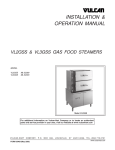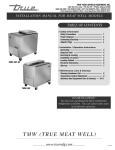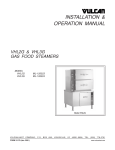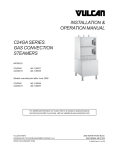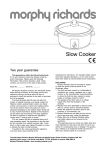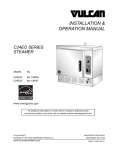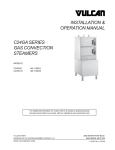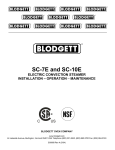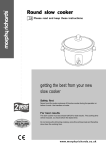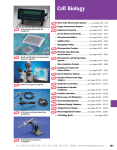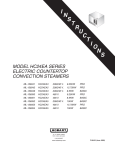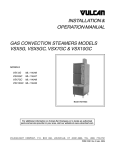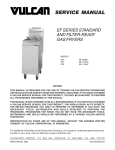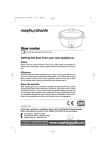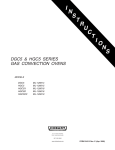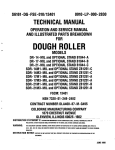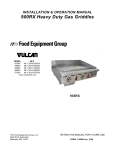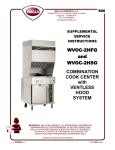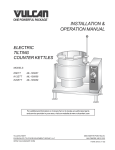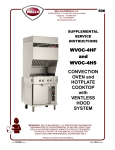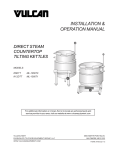Download Vulcan-Hart VL2GSS ML-52389 User's Manual
Transcript
INSTALLATION & OPERATION MANUAL VL2GSS & VL3GSS GAS FOOD STEAMERS MODEL VL2GSS VL3GSS ML-52389 ML-52393 Model VL2GSS For additional information on Vulcan-Hart or to locate an authorized parts and service provider in your area, visit our website at www.vulcanhart.com VULCAN-HART DIVISION OF ITW FOOD EQUIPMENT GROUP, LLC WWW.VULCANHART.COM P.O. BOX 696, LOUISVILLE, KY 40201-0696 TEL. (502) 778-2791 FORM 35409 Rev. A (Aug. 2004) IMPORTANT FOR YOUR SAFETY THIS MANUAL HAS BEEN PREPARED FOR PERSONNEL QUALIFIED TO INSTALL GAS EQUIPMENT, WHO SHOULD PERFORM THE INITIAL FIELD START-UP AND ADJUSTMENTS OF THE EQUIPMENT COVERED BY THIS MANUAL. POST IN A PROMINENT LOCATION THE INSTRUCTIONS TO BE FOLLOWED IN THE EVENT THE SMELL OF GAS IS DETECTED. THIS INFORMATION CAN BE OBTAINED FROM THE LOCAL GAS SUPPLIER. IMPORTANT IN THE EVENT A GAS ODOR IS DETECTED, SHUT DOWN UNITS AT MAIN SHUTOFF VALVE AND CONTACT THE LOCAL GAS COMPANY OR GAS SUPPLIER FOR SERVICE. FOR YOUR SAFETY DO NOT STORE OR USE GASOLINE OR OTHER FLAMMABLE VAPORS OR LIQUIDS IN THE VICINITY OF THIS OR ANY OTHER APPLIANCE. WARNING: IMPROPER INSTALLATION, ADJUSTMENT, ALTERATION, SERVICE OR MAINTENANCE CAN CAUSE PROPERTY DAMAGE, INJURY OR DEATH. READ THE INSTALLATION, OPERATING AND MAINTENANCE INSTRUCTIONS THOROUGHLY BEFORE INSTALLING OR SERVICING THIS EQUIPMENT. IN THE EVENT OF A POWER FAILURE, DO NOT ATTEMPT TO OPERATE THIS DEVICE. © VULCAN-HART, 2003 –2– TABLE OF CONTENTS GENERAL ......................................................... 4 INSTALLATION . . . . . . . . . . . . . . . . . . . . . . . . . . . . . . . . . . . . . . . . . . . . . . . . . . . . . . . Unpacking . . . . . . . . . . . . . . . . . . . . . . . . . . . . . . . . . . . . . . . . . . . . . . . . . . . . . . Remove the Burner Shipping Restraint . . . . . . . . . . . . . . . . . . . . . . . . . . . . . . Location . . . . . . . . . . . . . . . . . . . . . . . . . . . . . . . . . . . . . . . . . . . . . . . . . . . . . . . Installation Codes and Standards . . . . . . . . . . . . . . . . . . . . . . . . . . . . . . . . . . . Requirements for Gas Appliances. . . . . . . . . . . . . . . . . . . . . . . . . . . . . . . . . . . Leveling and Anchoring . . . . . . . . . . . . . . . . . . . . . . . . . . . . . . . . . . . . . . . . . . . Plumbing Connections . . . . . . . . . . . . . . . . . . . . . . . . . . . . . . . . . . . . . . . . . . . . Water Requirements . . . . . . . . . . . . . . . . . . . . . . . . . . . . . . . . . . . . . . . . . . Water Supply Connections . . . . . . . . . . . . . . . . . . . . . . . . . . . . . . . . . . . . . Drain . . . . . . . . . . . . . . . . . . . . . . . . . . . . . . . . . . . . . . . . . . . . . . . . . . . . . . Gas Connection . . . . . . . . . . . . . . . . . . . . . . . . . . . . . . . . . . . . . . . . . . . . . . . . . Testing the Gas Supply System . . . . . . . . . . . . . . . . . . . . . . . . . . . . . . . . . . . . Flue-Gas Exhaust — A Ventilating Hood is Recommended . . . . . . . . . . . . . . Electrical Connection . . . . . . . . . . . . . . . . . . . . . . . . . . . . . . . . . . . . . . . . . . . . . Installation Drawing . . . . . . . . . . . . . . . . . . . . . . . . . . . . . . . . . . . . . . . . . . . . . . Drain Requirements . . . . . . . . . . . . . . . . . . . . . . . . . . . . . . . . . . . . . . . . . . . . . . 4 4 4 4 5 5 5 6 6 6 6 7 7 7 7 8 9 OPERATION . . . . . . . . . . . . . . . . . . . . . . . . . . . . . . . . . . . . . . . . . . . . . . . . . . . . . . . . Steamers with Electronic Ignition . . . . . . . . . . . . . . . . . . . . . . . . . . . . . . . . . . Steam Cooking — Compartment Operation . . . . . . . . . . . . . . . . . . . . . . . . . . Shut Down at End of Day . . . . . . . . . . . . . . . . . . . . . . . . . . . . . . . . . . . . . . . . . To Shut Off for an Extended Shutdown . . . . . . . . . . . . . . . . . . . . . . . . . . . . . Selection of Pans for Steam Cooking . . . . . . . . . . . . . . . . . . . . . . . . . . . . . . . Cleaning . . . . . . . . . . . . . . . . . . . . . . . . . . . . . . . . . . . . . . . . . . . . . . . . . . . . . . Cooking Compartment Drains . . . . . . . . . . . . . . . . . . . . . . . . . . . . . . . . . . . . . Boiler Blowdown . . . . . . . . . . . . . . . . . . . . . . . . . . . . . . . . . . . . . . . . . . . . . . . . Compartments . . . . . . . . . . . . . . . . . . . . . . . . . . . . . . . . . . . . . . . . . . . . . . . . . Door Gaskets . . . . . . . . . . . . . . . . . . . . . . . . . . . . . . . . . . . . . . . . . . . . . . . . . . Leave Compartment Doors Open . . . . . . . . . . . . . . . . . . . . . . . . . . . . . . . . . . Guidelines for Maintaining Stainless Steel Surfaces . . . . . . . . . . . . . . . . . . . 10 10 12 12 12 13 14 14 14 14 15 15 15 MAINTENANCE . . . . . . . . . . . . . . . . . . . . . . . . . . . . . . . . . . . . . . . . . . . . . . . . . . . . . . Water Treatment System . . . . . . . . . . . . . . . . . . . . . . . . . . . . . . . . . . . . . . . . . Door Gaskets . . . . . . . . . . . . . . . . . . . . . . . . . . . . . . . . . . . . . . . . . . . . . . . . . . Water Level Gauge . . . . . . . . . . . . . . . . . . . . . . . . . . . . . . . . . . . . . . . . . . . . . Flue . . . . . . . . . . . . . . . . . . . . . . . . . . . . . . . . . . . . . . . . . . . . . . . . . . . . . . . . Scale Related Maintenance . . . . . . . . . . . . . . . . . . . . . . . . . . . . . . . . . . . . . . . Lubrication . . . . . . . . . . . . . . . . . . . . . . . . . . . . . . . . . . . . . . . . . . . . . . . . . . . . 15 15 15 16 16 16 16 TROUBLESHOOTING . . . . . . . . . . . . . . . . . . . . . . . . . . . . . . . . . . . . . . . . . . . . . . . . . 16 Service and Parts Information . . . . . . . . . . . . . . . . . . . . . . . . . . . . . . . . . . . . . 16 –3– Installation, Operation and Care of VL2 & VL3 GAS FOOD STEAMERS SAVE THESE INSTRUCTIONS FOR FUTURE USE GENERAL Vulcan-Hart suggests that you thoroughly read this entire manual and carefully follow all of the instructions provided. Your Vulcan Model VL Food Steamer is produced with quality workmanship and materials. Its boiler is fully automatic with the heat input controlled by preset pressure switches. A solenoid valve feeds makeup water as needed. The steamer is equipped with adjustable feet. Proper installation, usage and maintenance of your food steamer will result in many years of satisfactory performance. INSTALLATION Before installing, verify that the electrical service and gas supply (natural or propane) agrees with the specifications on the rating plate located on the boiler access door. If the supply and equipment requirements do not agree, do not proceed with the installation. Contact your dealer or Vulcan-Hart immediately. UNPACKING This food steamer was inspected before leaving the factory. The transportation company assumes full responsibility for safe delivery upon acceptance of the shipment. IMPORTANT: Immediately after unpacking, check for possible shipping damage. If the food steamer is found to be damaged, save the packaging material and contact the carrier within 15 days of delivery. REMOVE THE BURNER SHIPPING RESTRAINT The steamer is shipped as a complete unit and no assembly is required. However, the burner shipping restraint must be removed (Fig. 1). To do this, remove two hex nuts and two washers from the weldstuds on the boiler shell. Fig. 1 LOCATION Position the food steamer in its final location. Check that there are sufficient clearances to service the controls, for door swings, etc., so there will be no problem in making the required supply and drain connections. Recommended clearances for proper operation is 36" (91.4 cm) at the front. The required minimum clearance from combustible or noncombustible construction is 6" (15 cm) at the sides and back. The recommended clearances for servicing the steamer are 18" (46 cm) on the sides and back, and 36" (91.4 cm) in the front. Clearances less than 18" may require removal of adjacent equipment during servicing at customer's expence. Allow enough space between any other piece of equipment or a wall for access. All service on the compartment controls begins by removing the panel on the left side of the food steamer. Refer to the Installation Drawing on page 8 for installation location requirements. –4– INSTALLATION CODES AND STANDARDS In the United States, the Vulcan steamer must be installed in accordance with state and local codes, with the National Fuel Gas Code, (ANSI-Z223.1, latest edition) available from the American Gas Association, 1515 Wilson Boulevard, Arlington, VA 22209, with the National Electrical Code (ANSI/ NFPA No. 70, latest edition) available from the National Fire Protection Association, Batterymarch Park, Quincy, MA 02269 and with Vapor Removal from Cooking Equipment, (NFPA-96, latest edition) available from NFPA. In Canada, the steamer must be installed in accordance with local codes, with the National Fuel Gas Code (CAN/CGA-B149.1 latest edition) available from the Canadian Gas Association, 178 Rexdale Boulevard, Etobicoke, Ontario, Canada M9W 1R3, and with the Canadian Electrical Code (CSA C22.2 No.3, latest edition) available from the Canadian Standards Association, 178 Rexdale Boulevard, Etobicoke, Ontario, Canada M9W 1R3. REQUIREMENTS FOR GAS APPLIANCES Keep the food steamer free and clear from all combustible substances. Do not obstruct combustion and ventilation openings on the steamer. Do not obstruct the air flow into and around the food steamer. This air flow is necessary for proper combustion of gases and for ventilation of the food steamer. Provisions for ventilation and for incoming air supply for the equipment in the room must be in accordance with the National Fuel Gas Code, ANSI Z223.1 (latest edition). Do not obstruct the flow of flue gases from the flue duct located on the rear of the food steamer. It is recommended that the flue gases be ventilated to the outside of the building through a ventilation system installed by qualified personnel. For steamers equipped with casters, the installation shall be made with a connector that complies with the Standard for Connectors for Movable Gas Appliances, ANSI Z21.69 (latest edition), and a quick-disconnect device that complies with the Standard for Quick-Disconnect Devices for Use With Gas Fuel, ANSI Z21.41 (latest edition). Provide a gas line strain relief to limit the movement of the steamer without depending on the connector and any quick-disconnect device or its associated piping to limit the steamer movement. Attach the strain relief to the rear of the steamer (Fig. 2). If disconnection of the gas line strain relief is necessary, turn off gas supply before disconnection. Reconnect this strain relief before turning the gas supply on and returning the steamer to its originally installed position. 5/16 IN. DIA. HOLE PROVIDED FOR PL-52057 STRAIN RELIEF Fig. 2 LEVELING AND ANCHORING Place a level on the horizontal parts of the steamer. Adjust the feet at the base of the steamer to level the steamer in both the left-to-right and front-to-rear directions. After leveling, raise up the steamer on the right side about 1/16" to 1/8" (0.16 to 0.32cm) to drain the cooking compartments by rotating the adjustable flanged feet 1 to 11/2 turns clockwise. Check by pouring a little water in the compartment; all the water should drain. The feet have holes in the flanges for anchor bolts. –5– PLUMBING CONNECTIONS WARNING: PLUMBING CONNECTIONS MUST COMPLY WITH APPLICABLE SANITARY, SAFETY AND PLUMBING CODES. WATER REQUIREMENTS Water Requirements Proper water quality can improve the taste of the food prepared in the steamer, reduce liming in the steam generator and extend equipment life. Local water contitions vary from one location to another. Ask your municipal water supplier for details about your local water supply prior to installation. Supply Pressure Hardness* Silica Total Chlorine pH range Undissolved Solids * 20 — 60 psig less than 3 grains less than 13 ppm less than 4.0 ppm 7—8 less than 5 microns 17.1 ppm = 1 grain of hardness Presence of sediment, silica, excess chlorides or other dissolved solids may lead to a recommendation for alternate form(s) of water treatment. Test the water with the test strip included with the steamer. Other factors affecting steam generation are iron content, amount of chloridation and dissolved gases. A local water treatment specialist should be consulted before installation of steam generating equipment. Water Supply Connections A water filter system is recommended for the water supply line going to the treated water inlet of your steamer. Follow the recommendations for use and installation instructions shipped with the water filter. If a water filter is not installed, the steamer or steam generator warranty may be limited. Filtered Water Connection — 1/4" NPT. Used for boiler feed water. Unfiltered Water Connection — 1/4" NPT. Used as cold water condenser on boiler blow-down line. Drain CAUTION: In order to avoid any back pressure in the steamers, do not connect solidly to any drain connection. The drain must be the open air gap type. Provide a suitable floor sink with a minimum depth of 12" (30 cm). The floor sink is NOT to be located directly under the steamer. Local codes require that the maximum temperature of drain water must be no greater than 140°F (60°C). Refer to Fig. 4 on page 9. The drain pipe should be either iron or copper. DO NOT use PVC pipe; PVC pipe may lose its rigidity or glue may fail. –6– GAS CONNECTION CAUTION: All gas supply connections and any pipe joint compound used must be resistant to the action of liquefied petroleum gases. Codes require that a gas shutoff valve be installed in the gas line ahead of the steamer. Connect the gas supply line to the gas valve on the steamer. Make sure the pipes are clean and free of obstructions, dirt and piping compound. The gas line must be capable of delivering gas to the steamer without excessive pressure drop at the rate specified on the nameplate. Recommended gas line pressure is 7" W.C. (17.8 cm W.C.) for natural gas and 11" W.C. (27.9 cm W.C.) for propane gas. Refer to Fig. 3 on page 8. With adequate gas pressure, a 3/4" (1.9 cm) inside diameter black iron pipe to the steamer should be satisfactory. If adequate pressure is not available, a larger line such as 1" (2.5 cm) inside diameter may be used to assure adequate gas delivery. IMPORTANT: Check burner manifold pressure with a manometer at the 1/8" (0.32 cm) tap on the gas valve to make sure it is 4" W.C. for natural gas or 9" W.C. for propane. WARNING: PRIOR TO LIGHTING, CHECK ALL JOINTS IN THE GAS SUPPLY LINE FOR LEAKS. USE SOAP AND WATER SOLUTION. DO NOT USE AN OPEN FLAME. TESTING THE GAS SUPPLY SYSTEM When test pressures exceed 1/2 psig (3.45 kPa), the steamer and its individual shutoff valve must be disconnected from the gas supply piping system. When test pressures are 1/2 psig (3.45 kPa) or less, the steamer must be isolated from the gas supply system by closing its individual manual shutoff valve. FLUE-GAS EXHAUST — A VENTILATING HOOD IS RECOMMENDED DO NOT obstruct the flow of flue gases from the flue located on the rear of the steamer. It is recommended that the flue gases be ventilated to the outside of the building through a ventilation system installed by qualified personnel. Information on the construction and installation of ventilating hoods may be obtained from the standard for the Removal of Vapors from Commercial Cooking Equipment, NFPA No. 96 (latest edition), available from the National Fire Protection Association, Batterymarch Park, Quincy, MA 02269. ELECTRICAL CONNECTION WARNING: ELECTRICAL AND GROUNDING CONNECTIONS MUST COMPLY WITH THE APPLICABLE PORTIONS OF THE NATIONAL ELECTRICAL CODE AND/OR OTHER LOCAL ELECTRICAL CODES. WARNING: DISCONNECT THE ELECTRICAL POWER TO THE MACHINE AND FOLLOW LOCKOUT / TAGOUT PROCEDURES. The electrical diagram for the compartments is located on the inside of the upper left side panel. The electrical diagram for the steam generator is located on the inside of the left front door. The electrical supply (120 volt, 60 Hertz, 1 Phase) must be connected to the pigtail leads in the junction box located next to the boiler control box. Use #18 AWG copper wire suitable for at least 105°C temperature. Connect a grounding wire to the ground lug in the junction box. –7– INSTALLATION DRAWING LEGEND GAS CONNECTION: 3/4" NPT Models VL2GSS & VL3GSS BOILER FEED CONNECTION FOR FILTERED WATER: 1/4" NPT WATER CONNECTION FOR BOILER DRAIN CONDENSER: 1/ 4" NPT ELECTRICAL CONNECTION: 120 V, 60 HZ, 1 PH, 300 WATTS MAX DRAIN: 3 1/2" DIA. PROVIDE FLOOR SINK FOR OPEN GAP TYPE DRAIN. DO NOT PLACE FLOOR SINK DIRECTLY UNDER STEAMER. DO NOT CONNECT SOLIDLY TO ANY DRAIN CONNECTION. NOTE: DIMENSIONS WHICH LOCATE THE ABOVE CONNECTIONS HAVE A TOLERANCE OF + OR - 3 IN. (75 MM). NORMAL DIMENSIONS ARE IN INCHES. DIMENSIONS IN ( ) ARE IN MILLIMETERS. EQUIPMENT CLEARANCES TO COMBUSTIBLE CONSTRUCTION REAR: 6 INCH (152 MM) MINIMUM LEFT SIDE: 6 INCH (152 MM) MINIMUM RIGHT SIDE: 6 INCH (152 MM) MINIMUM WATER QUALITY MUST BE WITHIN THESE GUIDELINES: SUPPLY PRESSURE: 20 - 60 PSIG HARDNESS*: LESS THAN 3 GRAINS SILICA: LESS THAN 13 PPM TOTAL CHLORINE: LESS THAN 4.0 PPM pH RANGE: 7–8 UNDISSOLVED SOLIDS: LESS THAN 5 MICRONS * 17.1 PPM = 1 GRAIN OF HARDNESS Fig. 3 –8– DRAIN REQUIREMENTS The floor sink is not to be located under the steamer. Fig. 4 –9– OPERATION WARNING: THE STEAMER AND ITS PARTS ARE HOT. CLEANING AND SERVICING THE STEAMER. USE CARE WHEN OPERATING, STEAMERS WITH ELECTRONIC IGNITION 1. Make sure all supply connections for electric, gas and water are on. 2. Turn the knob on the Gas Combination Valve (Fig. 7) counterclockwise to the ON position. 3. If equipped with the Manual Blow Down Valve (Fig. 7), make sure it is closed. 4. Keep both valves (one each at the top and bottom) of the gauge glass open at all times. 5. Press the top half of the Boiler On – Off switch (Fig. 5) to turn it on. The red light comes on. 6. Make sure the Ignition Switch is ON (Fig. 6). 7. The electrode will begin sparking, and the pilot will light. 8. Look at pilot flame to make sure the pilot light has lit. If not, turn Ignition Switch Off, wait 5 minutes and repeat Step 6. If after the third attempt the pilot does not light, call for service. 9. The pilot light will remain lit as long as the Boiler On – Off switch is in the ON position. 10. When water level is satisfied, press Reset (Fig. 5). The Hi Limit Pressure and Low Water lights should go off and the main Burner should light. 11. The cycling pressure switch will open and close the combination valve, which, in turn, will cycle the main burner. HI LIMIT BOILER RESET PRESSURE ON - OFF LOW WATER IGNITION SWITCH DISCONNECT POWER BEFORE REMOVING THIS OR ANY PANEL GIVING ACCESS TO PARTS. BOILER OPERATING INSTRUCTIONS FOR SUPPLY CONNECTIONS USE 18 AWG COPPER WIRE SUITABLE FOR AT LEAST 221°F (105°C) 1) KEEP BOTH WATER GAUGE VALVES OPEN AT ALL TIMES 2) BE SURE WATER INLET VALVE IS OPEN. CLOSE ONLY FOR SERVICE OR LONG SHUT DOWN 3) TO START UNIT, PRESS 'BOILER ON-OFF' SWITCH. THE RED LIGHT WILL COME ON. WHEN THE WATER LEVEL IS SATISFIED, PRESS RESET SWITCH. THE AMBER LOW WATER INDICATOR AND THE HI LIMIT PRESSURE INDICATOR WILL GO OUT. 4) ALLOW 15 MINUTES FOR HEAT UP TIME. 5) TO TURN OFF, PRESS BOILER SWITCH. THE RED INDICATOR LIGHT WILL GO OFF. 6) BLOW DOWN BOILER DAILY. REFER TO OPERATING MANUAL FOR INSTRUCTIONS. Fig. 5 Fig. 6 – 10 – OPTIONAL MANUAL BLOW DOWN VALVE AUTOMATIC BLOW DOWN VALVE GAS COMBINATION VALVE Fig. 7 – 11 – STEAM COOKING — COMPARTMENT OPERATION Refer to the Steam Cooking with Vulcan Kettles and Steamers (booklet packed with your steamer) for suggested cooking times of various foods. All cooking times are approximate because size, weight, pan loading and product quality will affect steamer cooking times. Use these suggestions and then adjust cooking times to your own requirements. 1. Prepare vegetables, fruits, meats, seafood and poultry as you would for steam cooking or cooking in water, clean, separate, cut, remove stems, and place in a pan. 2. Place loaded pans in the compartment and close the compartment door. Turn the door screw handle clockwise to seal the door gasket. Additional tightening of the door screw may be needed to eliminate leaks. The compartment pressure gauge typically reaches a maximum pressure of (5 to 6 psi). 3. The timer knob must be turned to 5 minutes or beyond. The knob may then be turned back to a lower setting if a shorter cooking cycle is desired. Set the timer to the sum of the desired cooking time plus some minutes allowed for preheat. The preheat allowance will generally be 5 to 10 minutes. It will vary with the type, size, temperature and condition (frozen or thawed) of the load, and must be determined from experience. 4. Press the top half of the red switch located under the timer; the cooking light will come on. This closes the drain, allows steam to enter the compartment and starts the timer. The balance of the cooking time sequence is automatic. If steam leaks around the door gasket, tighten the door screw. Do not overtighten the door screw. Excessive tightening of the door screw may shorten gasket life and result in steam leakage around the gasket. 5. Steam automatically exhausts one minute before the end of the cooking cycle, and the steam supply shuts off. Never attempt to open the compartment door during the cooking cycle, when the cooking light is lit or before the buzzer sounds. 6. At the end of the cooking cycle (and the 1 minute exhaust period), the cooking light shuts off and the buzzer sounds. Turn the compartment switch off by pressing the bottom half of the red switch; this also shuts off the buzzer. Loosen the door screw and allow moisture to escape. After a few seconds, move the latch paddle to the left, then slowly open the door and remove the pans of food. SHUT DOWN AT END OF DAY WARNING: THE WATER BEING DRAINED IS HOT AND UNDER PRESSURE. USE CARE WHEN SERVICING THE STEAM GENERATOR. To prevent malfunction of controls from scale related clogging, it is essential to flush (blow down) the steam generator every day. This will remove accumulated minerals from the feed water and reduce internal scale build-up which could interfere with proper steam generator operation. Failure to blow down the steam generator every day may void the steamer warranty. 1. Turn the power switch OFF. Steamers equipped with automatic blow down will blow down. 2. If your steamer is equipped with manual blow down, open the blow down valve. TO SHUT OFF FOR AN EXTENDED SHUTDOWN For an extended shutdown, turn the Boiler On-Off switch off; turn the Ignition Switch off. Allow to blow down before water is shut off. Close the water inlet valve(s). Close the gas shutoff valve. Shut off the electrical supply to the machine. Clean the compartments. Leave the doors open. – 12 – SELECTION OF PANS FOR STEAM COOKING VL steamer compartments are designed to accept combinations of the following perforated or solid cooking pans (Fig. 8): PAN ACCOMODATION, PER COMPARTMENT Max Qty Pan Size Pan Depth 4 12 X 20 6 6 12 X 20 4 8 12 X 20 2 1/ 2 6 18 X 26 16 (center support removed) 1 12 x 20 1 Fig. 8 The following chart lists the type of pan to use for various foods: FRESH PRODUCT Type Pan Product Solid 12" x 20" Dehydrated fruits and vegetables Perforated 12" x 20" 18" x 26" Examples Dried peaches, prunes, apples, and appricots. Sliced onions and sliced potatoes. Cereals and puddings Cream of wheat, rolled oats, rice. Vegetables to be cooked in their own liquid Broccoli, brussels sprouts, peas, cauliflower. Meats and poultry To save broth, cook in solid pans. Canned foods Place opened can in solid pan or pour contents into the pan. Root vegetables* Potatoes, carrots, beets, turnips, onions, parsnips, rutabagas oyster plant. Sausages Frankfurters, weiners, garlic sausages, meat sausages. Leaf vegetables* Spinach, kale, turnip greens, collard greens, cabbage. Miscellaneous Corn on the cob, green beans, celery / celery hearts, green pepper shells, squash, mushrooms. Eggs in their shells. Precooked and partially cooked sliced meats Ham, meat loaf, roast beef, chicken, turkey, hamburger patties. * If you wish to save liquids from root or leaf vegetables, place them in a solid pan, or place a solid pan undet the perforated pan. – 13 – FROZEN PRODUCT Perforated Frozen Vegetables. Loosen and spread vegetable. Broccoli, asparagus spears, green beans, carrots, brussel sprouts, turnips, potatoes, cut corn, lima beans, peas, squash. Solid Precooked Dishes. Remove wrapping and place in pan. All precooked dishes, such as beef goulash, chicken fricasse, etc., which cannot be cooked in the containers in which they are packed. Separate frozen food packs into smaller chunks. If unpacked pre-cooked frozen dishes require more than 15 minutes to cook, cover the pan. When a cover is used, about one-third more cooking time is required. This is true only of foods in either portion size or in larger sizes which cannot be cooked in the covered containers in which they are packed. Cooking time required for frozen foods depends upon the amount of defrosting required. If time permits, allow the frozen foods to partially thaw overnight in a refrigerator. This will reduce their cooking times. CLEANING WARNING: DISCONNECT THE ELECTRICAL POWER TO THE MACHINE AND FOLLOW LOCKOUT/ TAGOUT PROCEDURES BEFORE CLEANING. COOKING COMPARTMENT DRAINS Keep compartment drains running freely. Inspect compartment drains daily for blockage. Remove any particles or debris from the perforated strainer daily (or more often if needed). After cooking greasy foods or seafood, close the doors and operate each compartment for 15 to 30 minutes to flush any residual grease and oils down the compartment drain. Make a solution of warm water and detergent and pour 1/2 gallon (1.9 liters) of it down each compartment drain. Rinse by pouring 1 /2 gallon (1.9 liters) of hot water down each compartment drain. BOILER BLOWDOWN To prevent malfunction of controls from scale related clogging, it is essential to blow down the boiler every day. This will flush out any accumulated minerals from the feed water. It will also aid in preventing internal scale buildup which would interfere with proper boiler operation. Failure to blow down the boiler every day may void the steamer warranty. The presence of minerals in suspension is indicated by a murky or milky condition in the first portion of the water drained. WARNING: THE WATER BEING DRAINED IS HOT AND UNDER PRESSURE. CLEANING OR SERVICING THE BOILER. USE CARE WHEN After the steamer boiler has been in operation, blow down the boiler for approximately 5 minutes. This will remove sediment, scale or lime buildup in the boiler. COMPARTMENTS Wash the inside of the compartment with a solution of warm water and detergent. Rinse with warm water. Once a week, thoroughly clean the exposed surfaces (sides, front, door and top) with a damp cloth and polish with a clean cloth. To remove discolorations, use a nonabrasive cleaner. – 14 – DOOR GASKETS Clean the gasket sealing surface of the compartment doors to remove harmful food acids for maximum gasket life. Do not use any solvents. Wash with a cloth moistened in a solution of mild detergent and warm water. Rinse with a fresh cloth moistened with warm water to remove all traces of detergent. Wipe dry with a clean cloth. Never apply food oils or petroleum lubricants directly to the door gasket. Petroleum-based solvents and lubricants will shorten gasket life. LEAVE COMPARTMENT DOORS OPEN CAUTION: Leave the compartment doors slightly open when the steamer is not in use. When the compartment is idle, never latch the door and apply pressure to the door gasket. Leaving the gasket under pressure can cause permanent deformation, greatly shortening gasket life. GUIDELINES FOR MAINTAINING STAINLESS STEEL SURFACES There are four things that can break down stainless steel and allow corrosion to develop: 1) abrasion, 2) deposits, 3) water and 4) chlorides. Avoid rubbing with steel pads, wire brushes or scrapers that can leave iron deposits on stainless steel. Instead, use plastic scouring pads or soft cloths. For stubborn stains, use products such as Cameo, Talc or Zud First Impression. Always rub parallel to the polish lines or with the grain. Hard water can leave deposits that promote rust on stainless steel. Treated water from softeners or certain filters can eliminate these mineral deposits. Other deposits from food or lubrication must be properly removed by cleaning. Use mild detergent and nonchloride cleaners. Rinse thoroughly. Wipe dry. If using chloride-containing cleaners or sanitizers, rinse repeatedly to avoid stainless steel corrosion. Where appropriate, apply a polish recommended for stainless steel (such as Benefit or Super Sheen) for extra protection and lustre. MAINTENANCE WARNING: THE STEAMER AND ITS PARTS ARE HOT. CLEANING AND SERVICING THE STEAMER. USE CARE WHEN OPERATING, WARNING: DISCONNECT THE ELECTRICAL POWER TO THE MACHINE AND FOLLOW LOCKOUT / TAGOUT PROCEDURES. WATER TREATMENT SYSTEM A water treatment system is recommended for steam generators. Refer to your supplier's manual for normal maintenance procedures for proper scale-free operation recommendations. DOOR GASKETS If the door gasket is nicked or cut, it must be replaced. Damage to the gasket sealing surface will cause steam leakage. If a leak occurs in one corner only and the gasket appears serviceable, turn the stainless steel screw on the gasket plate adjacent to the leaking corner one-half turn counterclockwise. Do not attempt excessive turning of screws since misalignment of the door is possible. If the door is misaligned, call your local Vulcan-authorized servicer. – 15 – WATER LEVEL GAUGE Check the water level gauge sight glass daily. The correct water level is approximately 1" ( 2.5 cm) of water visible in the water level gauge sight glass. Extremely murky water in the sight glass indicates bad water conditions. The boiler should be blown down. If conditions persist, have the boiler inspected and cleaned by your local Vulcan-Hart servicer. FLUE Annually, when the steamer is cool, check the flue and clear any obstructions. SCALE RELATED MAINTENANCE Periodic maintenance is necessary to keep your boiler clean and efficient. Initially, after three months of steamer usage, it is recommended that you have your Vulcan-Hart authorized servicer inspect the boiler and perform the descaler maintenance described below. Local water conditions and steamer usage will determine the frequency that this service must be repeated; however, a minimum recommendation is once a year. This maintenance is not covered by warranty. Cathodic protector(s) are provided inside the boiler to reduce boiler and component corrosion and reduce accumulation of scale from forming on the boiler interior walls. The cathodic protector(s) will be consumed. How fast the cathodic protector(s) will be consumed depends upon the chemical makeup of the feed water and the average volume of feed water used. An inspection by service personnel is recommended so that the expected normal life of the cathodic protector(s) can be estimated under your operating conditions. Thereafter, the cathodic protector(s) can be serviced at the appropriate frequency for your situation. LUBRICATION The door screw was factory lubricated with high-temperature grease, but will require periodic relubrication by applying a bead of lubricant across the door handle screw threads. When the door screw is properly lubricated, the hand pressure required to seal the door is greatly reduced and the life of the screw and nut are lengthened. Frequency of lubrication depends upon use. Lubricate monthly at first and let experience determine the frequency. A high-temperature grease for the door screw can be obtained from Vulcan-Hart. TROUBLESHOOTING Symptoms Possible Causes Steamer will not heat or build pressure. 1. 2. 3. 4. 5. 6. Water accumulates in compartment. Drain may be clogged. Clear drain. Other problems. Contact Service. Water supply to steamer is not turned on. Water filter may be clogged. Main gas supply valve may be turned off. Electrical supply may be off or disconnected. Combination gas valve may be turned off. Ignition switch may be turned off. SERVICE AND PARTS INFORMATION To obtain service and parts information concerning this steamer, contact the Vulcan-Hart Service Agency in your area (refer to listing supplied with the steamer), or contact the Vulcan-Hart Service Department at the address or phone number shown on the front cover of this manual. Parts and service manuals are also available at WWW.VULCANHART.COM FORM 35409 Rev. A (Aug. 2004) – 16 – PRINTED IN U.S.A.
















